
The Union of European Football Associations is one of six continental bodies of governance in association football. It governs football, futsal and beach football in Europe and the transcontinental countries of Turkey, Azerbaijan, Georgia and Kazakhstan, as well as the West Asian countries of Cyprus, Armenia and Israel. UEFA consists of 55 national association members. Since 2022, due to the Russian invasion of Ukraine, FIFA and UEFA suspended all Russian national teams and clubs from any FIFA and UEFA competitions.
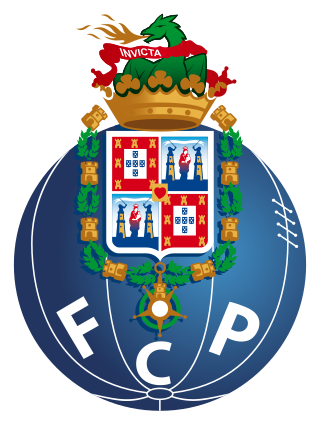
Futebol Clube do Porto, MHIH, OM, commonly known as FC Porto or simply Porto, is a Portuguese professional sports club based in Porto. It is best known for the professional football team playing in the Primeira Liga, the top flight of Portuguese football.
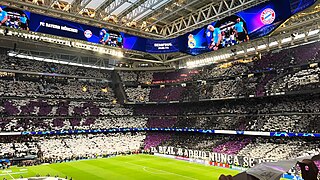
Santiago Bernabéu Stadium is a football stadium in Madrid, Spain. With a seating capacity of 80,000, the stadium has the second-largest seating capacity for a football stadium in Spain. It has been the home stadium of Real Madrid since its completion in 1947.

The Estádio do Dragão is an all-seater football stadium in Porto, Portugal, and the home ground of FC Porto since 2003. It has a seating capacity of 50,033, making it the third largest football stadium in Portugal.

The Municipal Stadium of Braga is an all-seater football stadium located in Braga, Portugal, and the current home of Sporting Clube de Braga. It has a capacity of 30,286 spectators, making it the seventh largest football stadium in Portugal. The stadium was designed by Portuguese architect Eduardo Souto de Moura who was awarded the Pritzker Architecture Prize in part for this design.

Sport Lisboa e Benfica, commonly known as Benfica, is a professional football club based in Lisbon, Portugal, that competes in the Primeira Liga, the top flight of Portuguese football.

The Estádio da Luz, officially named Estádio do Sport Lisboa e Benfica, is a multi-purpose stadium located in Lisbon, Portugal. It is used mostly for association football matches, hosting the home games of Portuguese club Benfica, its owner.

The Atatürk Olympic Stadium is a stadium in Istanbul, Turkey. Located in the western district of Başakşehir, it is the largest-capacity stadium in the country. The stadium is named after Mustafa Kemal Atatürk, the founder and first President of the Republic of Turkey. Its construction began in 1999 and was completed in 2002. It was originally built for Turkey's bid for the 2008 Olympic Games that were ultimately awarded to Beijing, China. It cost about US$140 million.

Estádio José Alvalade (Portuguese pronunciation:[ɨʃˈtaðjuʒuˈzɛalvɐˈlaðɨ]; is a football stadium in Lisbon, Portugal, home of Sporting Clube de Portugal. It was built adjacent to the site of the older stadium. The stadium is named after José Alvalade, the founder and first club member of Sporting CP in the early twentieth century.
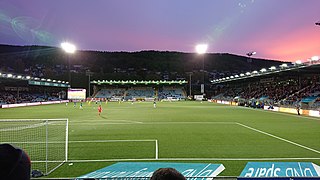
The Marienlyst Stadion has been the home ground of Strømsgodset Toppfotball since 1967. It's located on Marienlyst in Drammen, Norway.

Estádio da Luz, officially named Estádio do Sport Lisboa e Benfica, was a multi-purpose stadium located in Lisbon, Portugal.

The 2005 UEFA Cup Final was the final match of the 2004–05 UEFA Cup, the 34th season of the UEFA Cup, UEFA's second-tier club football tournament. The match was contested by Sporting CP and CSKA Moscow; CSKA won the match 3–1. Sporting CP opened the scoring in the first half from full-back Rogério, before Aleksei Berezutskiy equalised in the second half. Yuri Zhirkov would give the Russian side the lead nine minutes after CSKA's equalising goal, and the Moscow outfit would close out the scoring 15 minutes from the end after a quick CSKA counterattack saw Vágner Love become the youngest player to score in a UEFA Cup final at the age of 20 years, 341 days, firing the ball past Sporting goalkeeper Ricardo to give the Russian side a first UEFA Cup trophy.
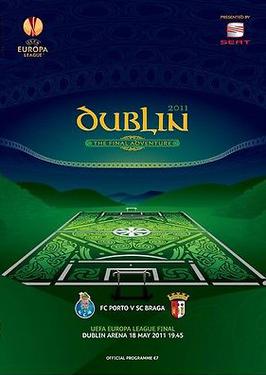
The 2011 UEFA Europa League Final was the final match of the 2010–11 UEFA Europa League, the 40th season of Europe's secondary club football tournament organised by UEFA, and the second season since it was renamed from UEFA Cup to UEFA Europa League. The match was played at the Aviva Stadium in Dublin, Republic of Ireland, on 18 May 2011, between two Portuguese teams – Porto and Braga – for the first time in UEFA competition finals.

The 2014 UEFA Champions League final was the final match of the 2013–14 UEFA Champions League, the 59th season of Europe's premier club football tournament organised by UEFA, and the 22nd season since it was renamed from the European Champion Clubs' Cup to the UEFA Champions League.

Baku Olympic Stadium is a stadium, designed and constructed to meet the international standards for stadiums set by the Union of European Football Associations (UEFA), the International Federation of Association Football (FIFA) and the International Association of Athletics Federations (IAAF). Having seating capacity for 69,870 people, it is the largest stadium in Azerbaijan.

The 2019–20 UEFA Champions League was the 65th season of Europe's premier club football tournament organised by UEFA, and the 28th season since it was renamed from the European Champion Clubs' Cup to the UEFA Champions League.
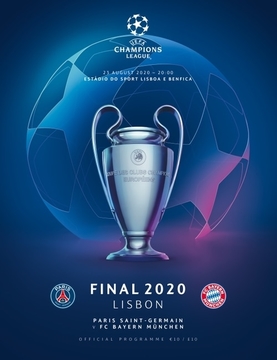
The 2020 UEFA Champions League final was the final match of the 2019–20 UEFA Champions League, the 65th season of Europe's premier club football tournament organised by UEFA, and the 28th season since it was re-branded from the European Champion Clubs' Cup to the UEFA Champions League. It was played on 23 August 2020 at the Estádio da Luz in Lisbon, Portugal, between French club Paris Saint-Germain, in their first European Cup final, and German club Bayern Munich having returned to the final since 2013. The match was held behind closed doors due to the COVID-19 pandemic in Europe.
The 2018–19 UEFA Champions League group stage began on 18 September and ended on 12 December 2018. A total of 32 teams competed in the group stage to decide the 16 places in the knockout phase of the 2018–19 UEFA Champions League.

The 2021 UEFA Champions League final was the final match of the 2020–21 UEFA Champions League, the 66th season of Europe's premier club football tournament organised by UEFA, and the 29th season since it was renamed from the European Cup to the UEFA Champions League. It was played at the Estádio do Dragão in Porto, Portugal on 29 May 2021, between English clubs Manchester City, in their first European Cup final, and 2012 winners Chelsea. This was the third all-English final in the competition, after the 2008 and 2019 finals.

















